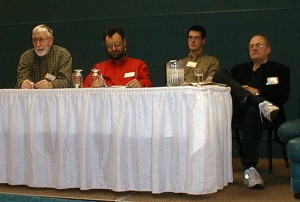We live in a science fiction world. Desktop computers, the World Wide Web, genetic engineering, cloning, space stations–they were all the stuff of science fiction not very many years ago.
This poses a problem for today’s science fiction writers. It’s becoming increasingly difficult to write “hard” science fiction, based on real, plausible scientific thought and discovery. Science is advancing so fast such stories become obsolete almost before they’re published.
This problem was discussed recently at ConSpec, a science fiction symposium for writers, editors, publishers and readers held in Edmonton by OnSpec, Canada’s best-known science fiction magazine. The session on “Is real science killing SF?” featured two SF writers who are also scientists, Peter Watts and Yves Meynard.
Dr. Watts said “We are on the steep part of the exponential curve” when it comes to scientific discovery. We’re rapidly approaching a time when Clarke’s Third Law kicks in, which states that “any sufficiently advance technology is indistinguishable from magic”–making hard SF, in turn, indistinguishable from fantasy.
The classic example of science making SF stories obsolete are old stories set on a Mercury that keeps the same face to the sun at all times. Now we know Mercury turns all sides to the sun as it orbits. It took years for those stories to become obsolete; today, it happens in mere months. If writers can’t keep up, Watts asked, why should they write hard SF at all?
The response boiled down to the argument that hard SF isn’t about getting all the details right, but about a tone or attitude; that readers of hard SF are looking for a story that appears to be plausible, and that takes a scientific, rational view of the world. Creating a story that uses real science has always been hard and isn’t getting any easier, but after all, the goal isn’t to create a scientific paper, but to create a good story.
That might have settled the issue, except the keynote speaker, John Clute, a novelist and critic who is co-author of the massive reference work “The Encyclopedia of Science Fiction,” expressed the opinion that SF, fantasy and horror are historical artifacts of the last two centuries, ways of looking at the world that have made a lot of sense during that time of immense change, but that have almost run their course. If they are to survive, which is by no means certain, Clute said, they will have to change drastically over the next couple of decades.
If that sounds like pretty heavy stuff, well, it was. The entire weekend was intellectually stimulating, if a little exhausting. Besides Clute, Watts and Meynard, guests included Nalo Hopkinson, a Toronto writer who just received the prestigious John W. Campbell Award for most promising new writer in the field, award-winning novelist Michael Swanwick, Calgary fantasy writer Dave Duncan, ex-Albertan Sean Stewart, and Candas Jane Dorsey, an Edmonton writer and editor.
Several panels focused on definitions of fantasy and science fiction, and Canadian SF in particular. Lighter topics included “I’d Love to Save the World, But We Can’t Find a Sitter,” about the how hard it is to make a parent of young children an action/adventure hero, and “Adventure Stories for Girls, and Other Tales Without Borders,” which focused on books for children with strong, positive female characters.
At one point, Michael Swanwick responded to the search for definitions at ConSpec with the thought that in order for something to be defined completely, it must be dead. Science fiction, he said, can’t be defined, because “it is a living, breathing, moving organism.”
As ConSpec proved, it is certainly living, breathing and moving in Canada, with writers, editors, readers and publishers determined to see it survive, and thrive, into the 21st century.








